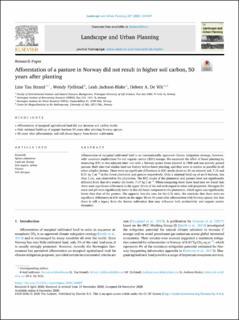| dc.contributor.author | Strand, Line Tau | |
| dc.contributor.author | Fjellstad, Wendy Jane | |
| dc.contributor.author | Jackson-Blake, Leah Amber | |
| dc.contributor.author | de Wit, Heleen | |
| dc.date.accessioned | 2021-11-02T07:02:17Z | |
| dc.date.available | 2021-11-02T07:02:17Z | |
| dc.date.created | 2021-01-15T16:33:01Z | |
| dc.date.issued | 2020 | |
| dc.identifier.citation | Landscape and Urban Planning. 2020, 207 . | |
| dc.identifier.issn | 0169-2046 | |
| dc.identifier.uri | https://hdl.handle.net/11250/2827106 | |
| dc.description.abstract | Afforestation of marginal cultivated land is an internationally approved climate mitigation strategy, however, with uncertain implications for soil organic carbon (SOC) storage. We examined the effect of forest planting by measuring SOC at two adjacent sites: one with a Norway spruce forest planted in 1968 and one actively grazed pasture. Both sites had similar land-use history before forest planting, and they were as similar as possible in all other edaphic factors. There were no significant differences in SOC stocks down to 30 cm mineral soil, 7.15 and 8.51 kg C m−2 in the forest plantation and pasture respectively. Only a minimal build-up of an O horizon, less than 2 cm, was observed in the plantation. The SOC stocks of the plantation and pasture were not significantly different from that of a nearby old forest, 7.17 kg C m−2. When comparing these three land-uses we found that there were significant differences in the upper 10 cm of the soil with regard to other soil properties. Nitrogen (N) stock and pH were significantly lower in the old forest compared to the plantation, which again was significantly lower than that of the pasture. The opposite was the case for the C/N ratio. We conclude that there were no significant differences in SOC stocks in the upper 30 cm 50 years after afforestation with Norway spruce, but that there is still a legacy from the former cultivation that may influence both productivity and organic matter dynamics. | |
| dc.language.iso | eng | |
| dc.title | Afforestation of a pasture in Norway did not result in higher soil carbon, 50 years after planting | |
| dc.type | Peer reviewed | |
| dc.type | Journal article | |
| dc.description.version | publishedVersion | |
| dc.source.pagenumber | 8 | |
| dc.source.volume | 207 | |
| dc.source.journal | Landscape and Urban Planning | |
| dc.identifier.doi | 10.1016/j.landurbplan.2020.104007 | |
| dc.identifier.cristin | 1872355 | |
| dc.relation.project | Norges forskningsråd: 194051 | |
| dc.relation.project | Norges forskningsråd: 235560 | |
| cristin.ispublished | true | |
| cristin.fulltext | original | |
| cristin.qualitycode | 2 | |
